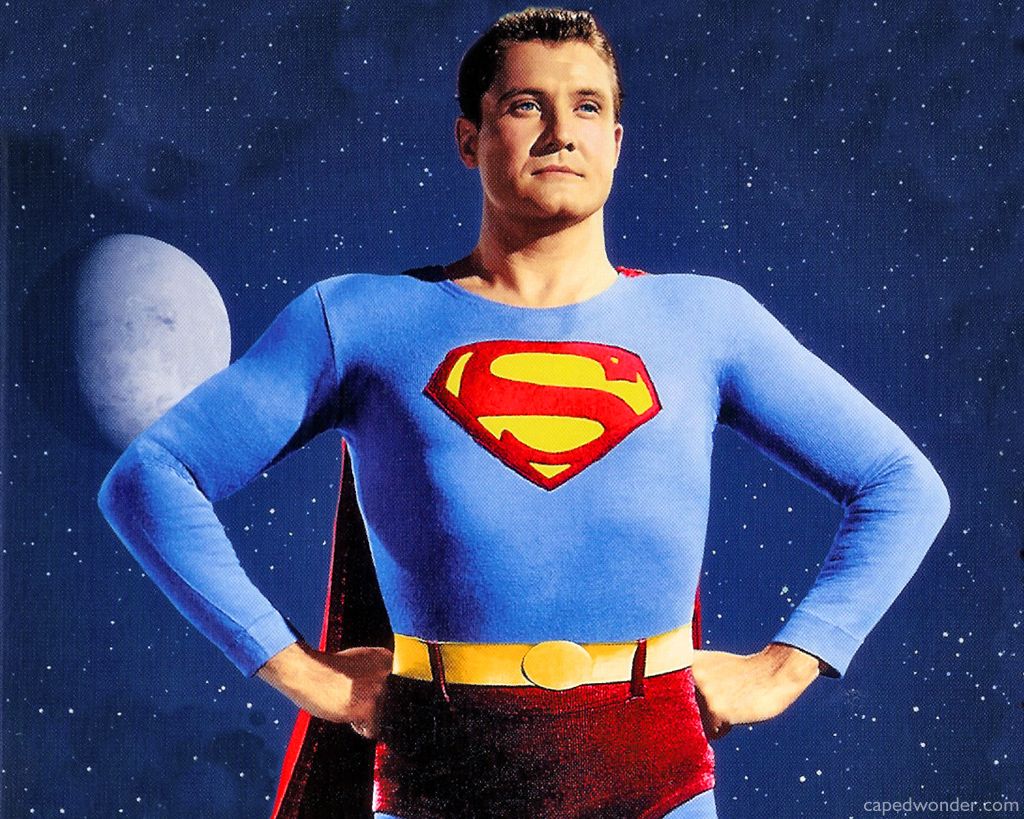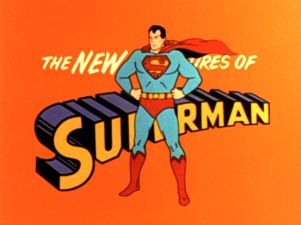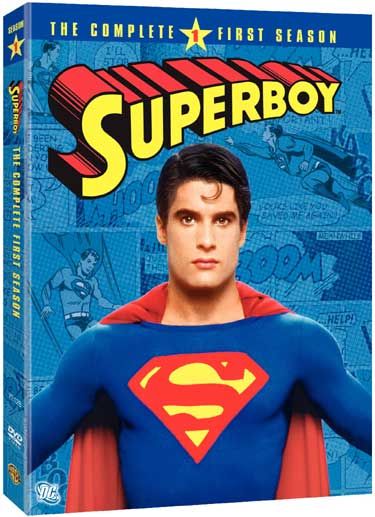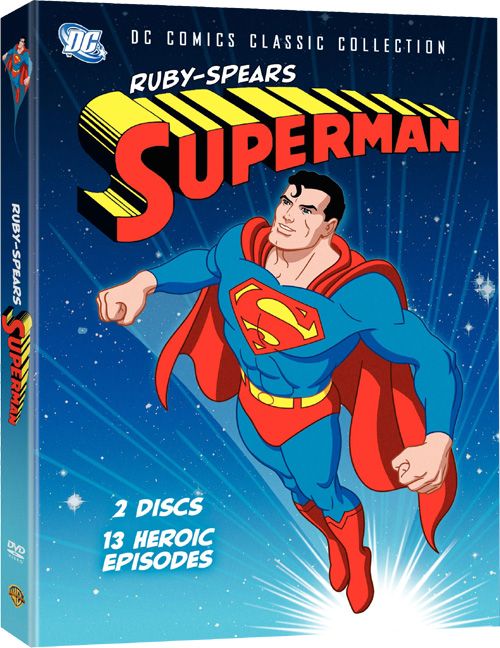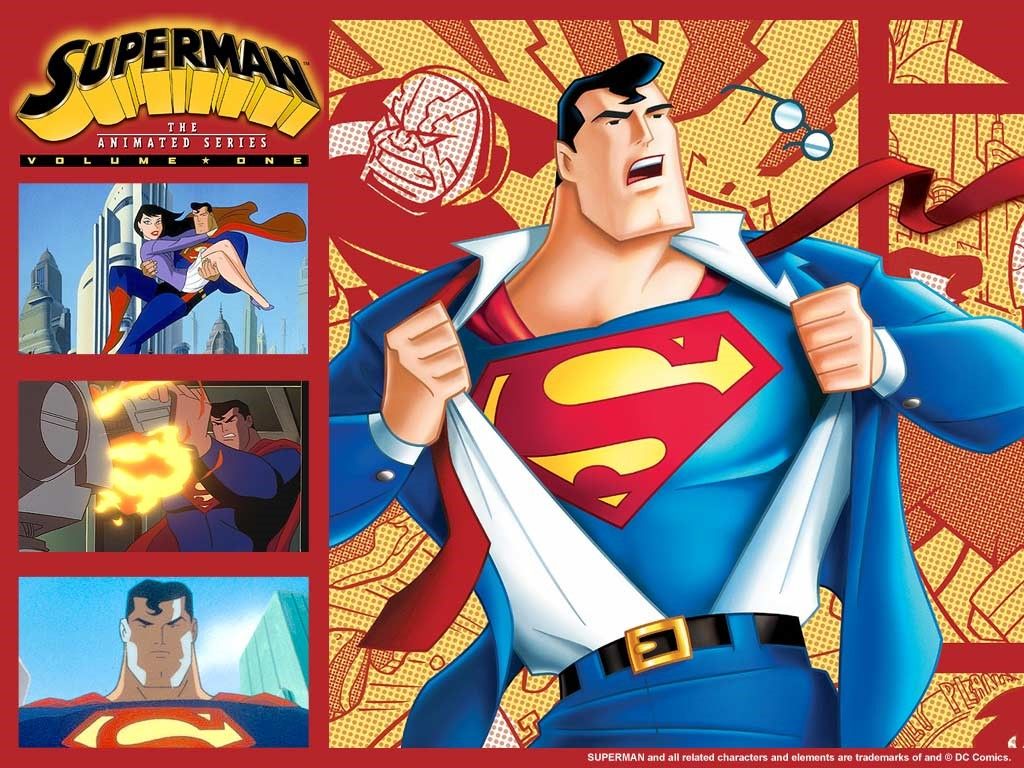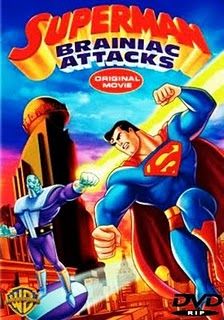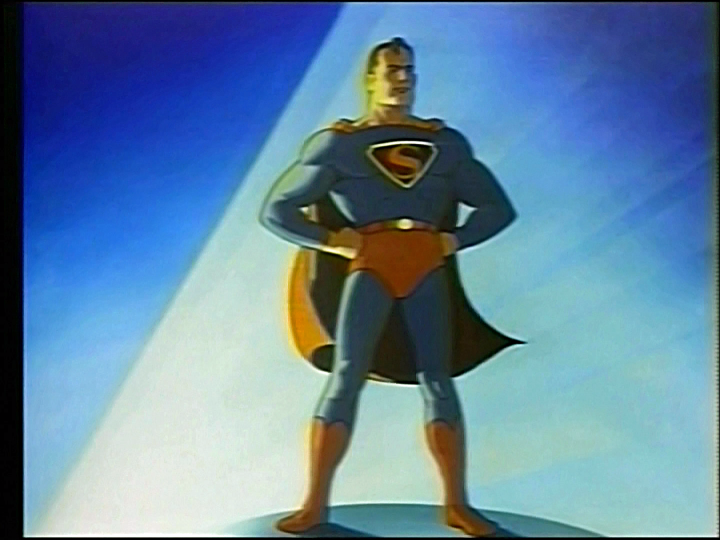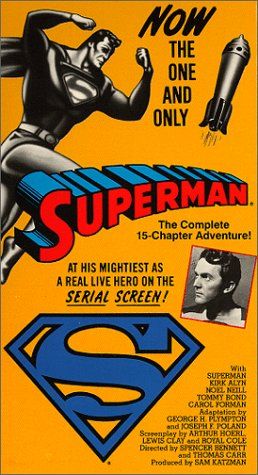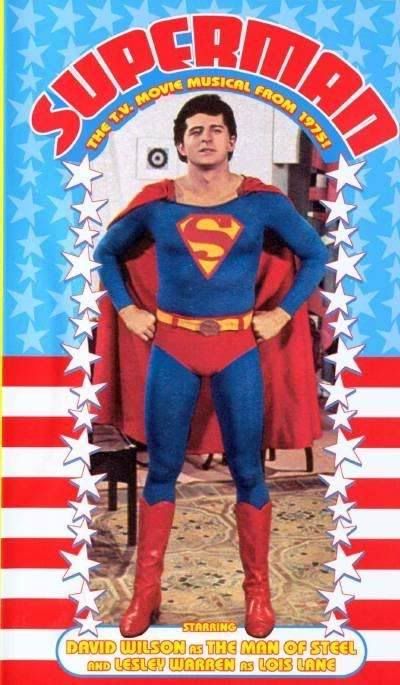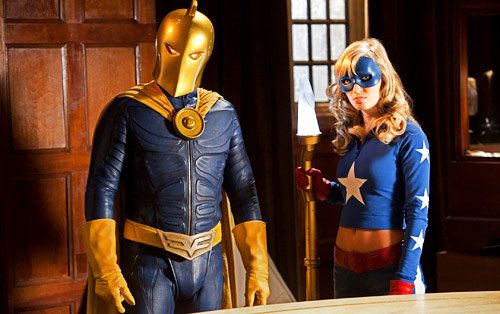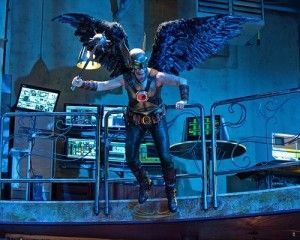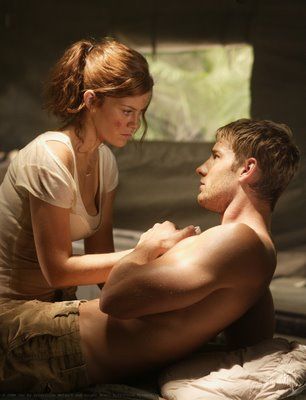Okay, this is just a weird thought that struck me after I got the news that Smallville had been renewed yet again.
I suddenly realized that there are almost as many hours of Smallville on film as there are of all the other Superman TV adaptations combined.
Seriously. Here are the numbers.
The George Reeves TV show from the fifties ran six seasons.
That's 104 half-hour episodes, or 52 hours.
The Filmation cartoon from the 1960s, The New Adventures of Superman ("my" Superman cartoon) ran 68 six-minute cartoons in various combinations, and additionally did 34 Adventures of Superboy shorts as well.
102 cartoons in all, at six minutes each. Total running time roughly ten hours and change.
The syndicated live-action Superboy ran 100 half-hour episodes.
That's 50 hours. (I'm just figuring them as they aired, we won't be nitpicky enough to count up the actual minutes of running time without commercials.)
The animated Ruby-Spears Superman was 13 half-hour episodes.
Six and a half hours.
Lois and Clark: The New Adventures of Superman ran four seasons in all.
That's 87 hour-long episodes.
The WB's Superman: The Animated Series aired 54 half-hour episodes in all.
That gives us twenty-seven hours. Add the two Superman features Doomsday and Brainiac Attacks and that is three more.
Technically it's not strictly a Superman adaptation but we'll be a little flexible and count Superman/Batman: Public Enemies, too. There's another hour and a half. We'll stop before we have to figure in Superboy and the Legion, Super Friends, Justice League ... I don't think those should count, those are really more adaptations of the team-book comics they're based on.
Almost forgot to count the Fleischer Superman cartoons from the 1940s. There were seventeen six-minute shorts.
That's a little over an hour and a half but we'll round up and call it two hours.
So sticking to just Superman-centric material, the total comes to 239 hours in all. If you choose to count the Fleischer cartoons as being part of the TV stuff, which some purists may not despite their airing on TV fairly often when I was younger.
Or you may not choose to count any cartoons at all. Live action only is 189 hours. Now if you want to talk just live-action Superman on film or television, period, you can add the Kirk Alyn serials, Superman and the Mole Men, the four Christopher Reeve films and Bryan Singer's Superman Returns and you end up with roughly 209 hours.
Even throwing in the 1970s television airing of the Broadway musical It's a Bird! It's a Plane! It's Superman! and you still clock in at 211 total. Add Supergirl with Helen Slater and that makes 213 hours of Kryptonians in live action.
Okay? That's everything else, before you get to Smallville.
Bearing in mind all those numbers I just went through for you, consider this. When Smallville wraps its tenth and final season, that will come to 217 hour-long shows.
Boggles the mind, doesn't it? What really pulled me up short was the startling notion that for two or three generations of grade-school kids, Smallville is their primary -- maybe only -- experience of any kind of Superman story at all.
Now, I have to be honest with you. I don't care for Smallville. I liked a lot of the first year, freak-of-the-week villains and all, because the stories resonated with the Superboy comics I enjoyed in my youth.
But they lost me in the second season with that mystical bullshit about the Kryptonian cave shamanism or whatever the hell that was. And though we've watched the show sporadically since then, we are usually confused by the changes to the status quo -- Wait, Lionel Luthor's a good guy now? Wasn't he in jail? Wait, Kryptonians have been coming to Earth -- to Smallville -- for decades? Huh? Chloe has powers now? What? -- and so on.
It's not just us, either. True story -- a fellow I know from the printing industry came up to me the other day and said, "Hey, you know comics. Wasn't Zod a bad guy?"
"General Zod? 'Kneel before me, son of Jor-El?' That guy? Yeah, he was very bad. Lots worse in the comics, actually, than the movies."
"Well, in Smallville, he's a good guy." And the guy glared at me like it was my fault. Clearly, this was just wrong and he wanted an explanation.
Since we hadn't been watching the show and I had no idea what he was talking about, all I could do is shrug and say, "Well, that's Smallville." (The parallel to Jake, it's Chinatown was not lost on me, and I almost started to laugh, but I didn't want to offend the printing guy by making light of something he obviously was upset about. I waited until he was out of earshot before I cracked up.)
The last time we watched it was the big JSA episode, which wasn't exactly bad, but it wasn't good either.
There was a lot of the usual wait, what? that we go through every time we try to get through an episode... Wait, what? Clark's superhero identity is a black trenchcoat? They call him the Blur? He works at the Daily Planet with Lois... but no glasses? Huh? And I was frankly baffled as to why they even tried to use Hawkman at all when it was obvious that they couldn't figure out a way to make the wings look... well, not ridiculous.
But those are all, at the end of the day, fanboy nitpicks. There are lots of other superhero adaptations that made extensive changes to the source material as well, that we like just fine.
The reason Smallville doesn't work for us is that it's depressing. Everyone is whiny and self-obsessed. The pace is glacially slow. Even the music is dour. And there are times that it goes beyond depressing into being actively skeevy... like, say, when high-school senior Lana Lang was boning the assistant football coach (sorry, no matter how many times Kristin Kreuk delivered the defensive line about how she was eighteen and it was all legal, that's just a big EWWW.)
Or, as my wife dismisses it, "It's just Dawson's Creek with superpeople."
That's the case for the prosecution. But...
...about twenty times as many people currently watch Smallville as read Superman comics. Any Superman comics. The pilot episode made ratings history at the WB, with an unprecedented 8.4 million viewers. After nine seasons, Smallville has averaged approximately 4.47 million viewers per episode, with the second season averaging the highest audience numbers at 6.3 million. Of course, there's attrition that sets in after almost a decade on the air, but on TV attrition doesn't mean the same thing as in comics. The numbers are still stratospheric compared to DC Comics numbers. The JSA episode was seen by 2.8 million viewers.
By contrast, the average issue of a Superman comic is read by somewhere between forty and fifty thousand people. Even if you assume that it's completely different people reading those titles -- in other words, there's no overlap between, say, the 44,000 people reading Action and the 50,000 people reading Superman: Secret Origin, which I really doubt, but hell, let's say it's so -- the biggest number you can squeeze out of the comics circulation figures is a couple of hundred thousand. For Smallville, that's less than ten percent of their audience.
Here's what I'm wondering. What is Smallville doing right? Because clearly, a lot of people like it.
Granted, you have to pay for a Superman comic. Smallville is broadcast for free. That factors into the equation somewhat. But still, the DVD sets massively outsell the comics, too.
Of course, people generally don't read as much as they watch TV, or movies. Print sales of everything are way down compared to video. You have to consider that as well.
But, again, just looking at the numbers, even when you are careful to compare apples to apples -- that is to say, you only compare other prime-time superhero hourlong TV dramas to Smallville, you once again are left with the head-scratching statistic that Smallville still is far and away the big success story of the bunch. Closest runners-up are Heroes, The Incredible Hulk and Lois and Clark with four seasons each. Even if you stretch the definition a bit to include almost-superhero fare like Angel, Buffy the Vampire Slayer and The Six Million Dollar Man, the best you get is seven seasons for Buffy.
So no matter which way you look at it, Smallville is doing something right. Putting my personal prejudices aside for the moment, I tried to look at it objectively and come up with a few possibilities for what that something is. Here's my list.
Periodic reboots. Some of these were necessitated by changes in the cast -- virtually everyone that started with the show is gone now except for Tom Welling and Allison Mack -- but even for the first three seasons or so when the cast was relatively stable, the show still seemed to change its premise every season. The "Wait, what? Huh?" reaction that my bride and I invariably have comes from that. But for its fans, that probably keeps the show from getting stale.
Familiar without being old. The tagline for Smallville's premise has always been "Superman's early years." That never changes, no matter what else comes and goes. Whatever else viewers are stuck trying to figure out, they always have that one familiar idea to latch on to as an entry point. At the same time, everything else is unfamiliar... the current situation, for example. Clark and Lois are reporters at a great metropolitan newspaper, and in his secret identity Clark Kent fights supercrime. But everything else is different. And whenever a new character shows up from the DC universe -- Green Arrow, Perry White, Martian Manhunter -- they get the same new-but-not makeover.
Good casting. The actors on this show are often required to do amazingly silly and stupid things and they always hurl themselves into it with total abandon. Allison Mack, in particular, has been given some extraordinarily dumb things to say and do and I am constantly amazed at her ability to pull it off. There's never any winking at the audience from this cast (As our own Sean and Brandon pointed out earlier this week, the writers
wink at the audience all the time but that's not the same thing.) It's only after the show is over that we catch ourselves saying stuff like, "Wait, if that was the case then Clark could just have...." But while it's on the screen we generally believe it. That's the acting, because it sure isn't the writing.
Strong character stuff. You'll notice I didn't say 'consistent character stuff,' because Smallville's characters routinely contradict themselves from season to season, and occasionally even from one episode to another in the same season. But there's a lot of character-oriented -- as opposed to plot or action-oriented -- scenes on the show. In fact, the usual structure of a Smallville episode has the main plot resolved by the end of the third act, and the fourth act is a ten or fifteen-minute series of denouement scenes where the characters take turns figuring out how they feel about what happened and what they learned from it. That's unheard-of for typical adventure shows.
Soap-opera romance.The show is purportedly a coming-of-age story about how Clark Kent eventually becomes Earth's greatest hero, but come on.
The real engine that drives it is who's hooking up with who, who's secretly pining away for who, who's desperately hoping for.... you get the idea.
Unrequited or not, doesn't matter, it's all about who wants who. Clark and Lana. Lana and Whitney. Chloe and Clark. Lana and Jason. Lana and Luthor. Clark and Lois. Oliver and Lois. Oliver and Tess. Chloe and Jimmy. Chloe and Davis.
And those are just the ones I remember off the top of my head as an occasional viewer. I'm sure I missed a few. (Dozen.)
Looking over this list, something occurs to me... there's something oddly familiar about it. Soap opera romance, convoluted character histories and near-impenetrable continuity, actual plot a distant second to characters constantly talking about their feelings, occasional reboots of the premise, annual changes to the cast... I know I've seen that in comics. A lot.
And it hits me. Smallville isn't doing Superman at all. They're doing the Chris Claremont X-Men.
No wonder Smallville's so huge compared to the other Superman shows. They've hit on the same formula that made the industry's biggest comics franchise a sales juggernaut for decades. Hell, now that I think about it, the show's even depicted a subculture of mutants in hiding, only on Smallville they're called 'meteor freaks' or just 'people with abilities.'
And the funny part is that I bet it was completely coincidence that they hit on the Claremont formula. TV's always behind the print version by a few years.
Oh well. I still don't much like Smallville, but at least its success sort of makes sense to me now... as well as the reasons I don't care for it. After all, X-Men was also a series I liked in its early years but got to be too convoluted and depressing for me to keep up with.
When you look at it that way, I have to admit that it's a very accurate comics-to-screen translation. I do wonder, though, if any of the Smallville writers actually realize they accidentally adapted a completely different superhero comic than the one the show's ostensibly based on.
See you next week.

